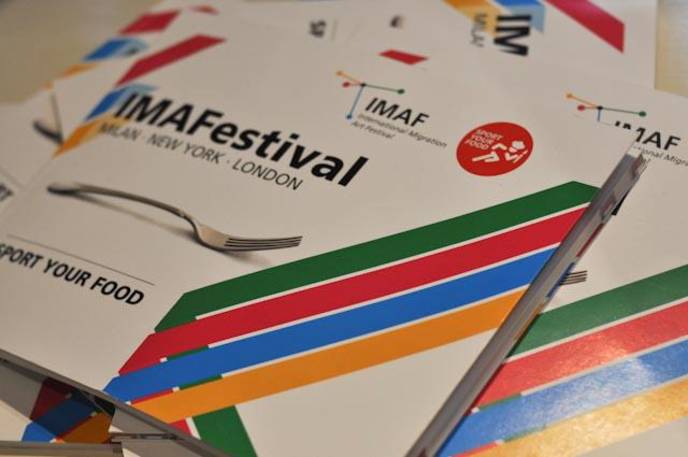


Before closing for the summer, Casa Italiana Zerilli Marimò [2] at NYU hosted another great event.
IMAFestival [3] in collaboration with the Fondazione Cesare Pavese presented a conference on the theme of translation moderated by IMAFestival organizer Rossella Canevari, featuring Italian best-selling writer Giorgio Faletti and the translator of his work, Antony Shugaar, and to discover and get to know Art Your Food literature and film categories winner who presented their works.
IMAF (International Migration Art Festival) was conceived by writer Rossella Canevari and Lawyer Elena Maria Manzini to discover new talents while focusing the spotlight on the relevant issue of migration, especially on its cultural and social dimensions.
The evening was divided into two parts: at first the audience viewed two short films
Senza Aggiunta di Conservanti (Without Preservatives) by Maria Tilli a beautifully crafted portrait of the old ritual of the making of tomato sauce that takes place every summer in Abruzzo. Three stunning old ladies keep tradition alive by working by a cauldron that is boiling outside in the late night breeze. Following this little jewel there was a screening of the 'Best Film' Category winner, Mexican Cuisine, by Spanish director Fran Guijarro. The short effectively shows, in just a fistful of minutes, how behind the kitchen doors of any type of restaurant, either Italian, Chinese or Japanese, there are Mexican workers who are able to prepare each and every specialty. Meanwhile, a soft-spoken narration explains the culture and ingredients of Mexican cuisine, but we don’t see any of the cooks cooking them. The short perfectly captures the theme of IMAFestival combining the art of food and migration.
The evening continued with readings of the 'Best Short Story' category winner Straniera a casa mia (Foreigner in my Own Home) by Egyptian native and second generation Italian writer Heba Madkour. With a pinch of humor and much reality the author portrayed the cultural differences, and foods, that make of her who she is today.
Madkour moved to Italy when she was only two years old and, like many immigrants, she feels like a foreigner both in her native land and in her adoptive country. She is the embodiment of both.
After her reading the audience was treated to an excerpt of Cesare Pavese’s The Moon and The Bonfires (the novel La Luna e i Falò was written in Italian in 1949 and it is considered Pavese's best work). Wikipedia writes: “the novel is set in the small town of Santo Stefano Belbo, in Piedmont, north-west Italy. The main protagonist, known only by his nickname of Anguilla (Eel), has returned to his hometown in the years immediately following the Second World War. He had left just before the war, ostensibly for political reasons, and had made his fortune in the United States. Returning to his hometown, he finds many of the same smells and sights that filled his youth, but he also finds a town and its inhabitants that have been deeply changed by war and by the passage of time. The first English language translation was undertaken by L. Sinclair in 1952. A more recent translation by R.W. Flint, published in 2002, uses the arguably more correct translation of the The Moon and the Bonfires, taking account of the use of the plural i Falò in the original Italian title.
Pavese was a poet, novelist, literary critic and translator. He was deeply influenced by American literature, and, “when official censorship closed his mouth, he would use his position as a translator and editor indirectly to bring into Italy messages of freedom and new ideas from English-language authors. Most Italians first encountered Herman Melville, James Joyce, William Faulkner, Charles Dickens, Gertrude Stein, John Steinbeck, John Dos Passos, and Daniel Defoe in Pavese's translations, and also encountered their influence, and echoes of their meditations, in Pavese's own highly accomplished body of novels, short stories, and poems,” the Poetry Foundation [4] writes.
This served as an introduction to the second part of the evening, the conference Writers & Translators. How a Bestseller becomes International. Giorgio Faletti, Antony Shugaar, Elena Maria Manzini and the President of the Fondazione Cesare Pavese [5], Luigi Icardi had a conversation about key issues regarding the dissemination of contemporary literature; unfortunately a rarely discussed topic especially regarding translation. “Translators such as the great writer Cesare Pavese were once highly regarded, but today the importance of the role of the translator is rarely acknowledged or publicized. Everyone knows the name of at least a couple of international writers, almost nobody can name the translators of important works. This phenomenon is counterproductive to the whole literary world and the movement of novels, which, if not well translated, lose quality and essentially differ from the original book,” The Foundation representative explained.
Translating is indeed a tough job where the translator has to dive into the author’s spirit and lead the reader in a dance between two different languages and cultures.
“The difficulty with translating Faletti’s work often lies in the jokes, puns (a word play exploiting multiple meanings of words) and rhymes, that have a specific meaning in Italian but lose it with a literal translation,” Shugaar explained. “Therefore the solution we came up with,” Faletti added, “was to cut them out in the English version. The book is much shorter but nobody has complained about it yet.”
Faletti even joked that there are parts in Shugaar’s work that sound better than the original Italian work. Excerpts of his newest novel, A Pimp’s Notes, were read in both languages and they both captured the audience… equally! The book is a mystery set in 1970’s Milan and is expected to be in bookstores on July 17th.
Source URL: http://test.iitaly.org/magazine/focus/art-culture/article/writers-translators-imafestival-art-migration-and-literature
Links
[1] http://test.iitaly.org/files/imaf1340761345jpg
[2] http://www.casaitaliananyu.org
[3] http://www.imafestival.com/en/
[4] http://www.poetryfoundation.org
[5] http://www.fondazionecesarepavese.it